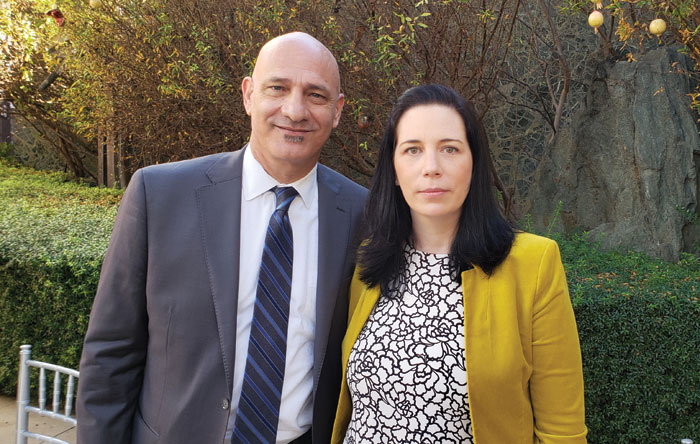 Rabbi Jonathan Aaron and Rabbi Sarah Bassin Photo by Ari L. Noonan
Rabbi Jonathan Aaron and Rabbi Sarah Bassin Photo by Ari L. Noonan In the wake of the Colleyville synagogue attack, leaders from seven different religions in Los Angeles stood before television cameras on January 21 and declared an iron fence of solidarity around–and with–the Jewish community.
They assembled in front of Temple Emanuel of Beverly Hills, where Senior Rabbi Jonathan Aaron and Rabbi Sarah Bassin welcomed them.
Aaron promptly established the tone that guided nearly a dozen speakers. Without identifying the religious preference of the attacker, he said, “We resist the impulse to stigmatize an entire religious tradition based on the actions of one hate-filled person. The scourge of antisemitism in the world calls for vigilant attention and concerted action. But the responsibility does not lie just with Jews.”
Perhaps the most prominent non-Jewish voice belonged to Salam Al-Marayati, president of the Muslim Public Affairs Council. He and UCLA History Professor David Myers organized the event to focus public attention on the American religious response to Colleyville.
“This scourge is not a Jewish problem. It is a social problem. Wherever we find it, we must speak out against it.” – Rabbi Jonathan Aaron
“It is important for all of us to be here to demonstrate our solidarity,” said Al-Marayati. “That is what our religious tradition dictates. This synagogue is part of my sacred space. It is our responsibility as Muslims, especially American Muslims, to speak out against antisemitism. This scourge is not a Jewish problem. It is a social problem. Wherever we find it, we must speak out against it.”
Acknowledging that “a terrible breach” occurred on Shabbat at Congregation Beth Israel, Rabbi Sharon Brous, leader of the IKAR community, said, “No person should ever fear for her life entering a house of worship. Ever.”
After noting that the synagogue invasion was an antisemitic act of terror, despite the FBI’s initial reluctance to brand it, Brous said, “Here’s the harder part: This act was committed by a Muslim extremist, a religious fundamentalist who was motivated by a toxic antisemitic lie that Jews hold disproportionate or even absolute power, that Jews control media, banks, government [and] even the weather, the same ideology that stands at the heart of white nationalism.”
Brous said this ideology “increasingly manifests on the political left in movements for social justice, including, inexplicably, in anti-racist spaces, the political home for most American Jews.”
Since the start of Shabbat was nearing in Texas as he spoke, Rabbi Yosef Kanefsky of Congregation B’nai David-Judea alluded to the Torah portion of the week, the dramatic story of the people standing at the foot of Mt. Sinai and hearing the voice of God.
“Rabbinic tradition teaches that there was one necessary precondition for that event, one prerequisite without which the people would not have been able to discern God’s voice amidst the thunder, amidst the cacophonous noise of the world” he said. “And this precondition was that they stand at the foot of the mount k’ish echad/b’lev echad (together).”
He continued, “When we stand together as faith communities, as human communities, and more than stand together, when with one heart we feel together, then we can hear.”
Aaron introduced a similar but separate notion, that the terrorist’s act “will not diminish our commitment to welcome the stranger, that more people will be called to guard our tongues from evil and hateful speech that gives license to such acts.”
The rabbi invoked the “unfulfilled words that President Washington wrote to a synagogue in the early days of our republic: ‘May the children of the stock of Abraham who dwell in the land continue to merit and enjoy the goodwill of the other inhabitants.’”
Bassin added, “May all of us – Jew, Muslim, Bahai, Sikh, Christian, Hindu, Buddhist, Jain – all of our communities, faith-based and secular, find this safety, that there shall be none to make us afraid.”























 More news and opinions than at a Shabbat dinner, right in your inbox.
More news and opinions than at a Shabbat dinner, right in your inbox.